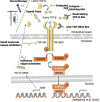Regulation of transforming growth factor-β signaling as a therapeutic approach to treating colorectal cancer
- PMID: 36156927
- PMCID: PMC9476856
- DOI: 10.3748/wjg.v28.i33.4744
Regulation of transforming growth factor-β signaling as a therapeutic approach to treating colorectal cancer
Abstract
According to data from 2020, Slovakia has long been among the top five countries with the highest incidence rate of colorectal cancer (CRC) worldwide, and the rate is continuing to rise every year. In approximately 80% of CRC cases, allelic loss (loss of heterozygosity, LOH) occurs in the long arm of chromosome 18q. The most important genes that can be silenced by 18q LOH or mutations are small mothers against decapentaplegic homolog (SMAD) 2 and SMAD4, which are intracellular mediators of transforming growth factor (TGF)-β superfamily signals. TGF-β plays an important role in the pro-oncogenic processes, including such properties as invasion, epithelial-mesenchymal transition (commonly known as EMT), promotion of angiogenesis, and immunomodulatory effects. Several recent studies have reported that activation of TGF-β signaling is related to drug resistance in CRC. Because the mechanisms of drug resistance are different between patients in different stages of CRC, personalized treatment is more effective. Therefore, knowledge of the activation and inhibition of factors that affect the TGF-β signaling pathway is very important.
Keywords: Colorectal cancer; Marker; Signaling pathway; Small mothers against decapentaplegic homologs; Transforming growth factor-beta.
©The Author(s) 2022. Published by Baishideng Publishing Group Inc. All rights reserved.
Conflict of interest statement
Conflict-of-interest statement: The authors declare having no conflict of interests for this article.
Figures





Similar articles
-
Resveratrol suppresses epithelial-to-mesenchymal transition in colorectal cancer through TGF-β1/Smads signaling pathway mediated Snail/E-cadherin expression.BMC Cancer. 2015 Mar 5;15:97. doi: 10.1186/s12885-015-1119-y. BMC Cancer. 2015. PMID: 25884904 Free PMC article.
-
Ginsenoside Rb2 inhibits epithelial-mesenchymal transition of colorectal cancer cells by suppressing TGF-β/Smad signaling.Phytomedicine. 2019 Mar 15;56:126-135. doi: 10.1016/j.phymed.2018.10.025. Epub 2018 Oct 22. Phytomedicine. 2019. PMID: 30668333
-
PEITC inhibits the invasion and migration of colorectal cancer cells by blocking TGF-β-induced EMT.Biomed Pharmacother. 2020 Oct;130:110743. doi: 10.1016/j.biopha.2020.110743. Epub 2020 Sep 17. Biomed Pharmacother. 2020. PMID: 34321176
-
TGF-β Modulated Pathways in Colorectal Cancer: New Potential Therapeutic Opportunities.Int J Mol Sci. 2024 Jul 5;25(13):7400. doi: 10.3390/ijms25137400. Int J Mol Sci. 2024. PMID: 39000507 Free PMC article. Review.
-
Transforming Growth Factor-β Signaling Pathway in Colorectal Cancer and Its Tumor Microenvironment.Int J Mol Sci. 2019 Nov 20;20(23):5822. doi: 10.3390/ijms20235822. Int J Mol Sci. 2019. PMID: 31756952 Free PMC article. Review.
Cited by
-
Genetic Alterations of NF-κB and Its Regulators: A Rich Platform to Advance Colorectal Cancer Diagnosis and Treatment.Int J Mol Sci. 2023 Dec 21;25(1):154. doi: 10.3390/ijms25010154. Int J Mol Sci. 2023. PMID: 38203325 Free PMC article. Review.
-
Stage-Dependent Levels of Brain-Derived Neurotrophic Factor and Matrix Metalloproteinase 9 in the Prognosis of Colorectal Cancer.Biomedicines. 2023 Jun 26;11(7):1839. doi: 10.3390/biomedicines11071839. Biomedicines. 2023. PMID: 37509480 Free PMC article.
-
Deciphering treatment resistance in metastatic colorectal cancer: roles of drug transports, EGFR mutations, and HGF/c-MET signaling.Front Pharmacol. 2024 Jan 10;14:1340401. doi: 10.3389/fphar.2023.1340401. eCollection 2023. Front Pharmacol. 2024. PMID: 38269272 Free PMC article. Review.
-
Targeting the TGF-β Signaling Axis in Metastatic Colorectal Cancer: Where Do We Stand?Int J Mol Sci. 2023 Dec 4;24(23):17101. doi: 10.3390/ijms242317101. Int J Mol Sci. 2023. PMID: 38069421 Free PMC article.
-
Integrating next-generation sequencing and artificial intelligence for the identification and validation of pathogenic variants in colorectal cancer.Front Oncol. 2025 May 19;15:1568205. doi: 10.3389/fonc.2025.1568205. eCollection 2025. Front Oncol. 2025. PMID: 40458721 Free PMC article.
References
Publication types
MeSH terms
Substances
LinkOut - more resources
Full Text Sources
Medical
Miscellaneous

